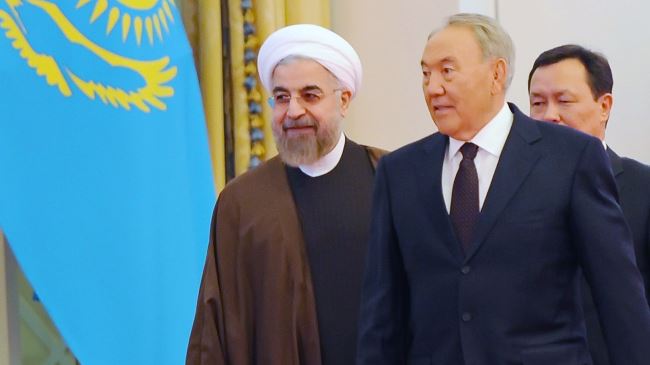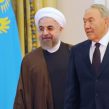
Iran Courts Kazakhstan to Reengage With Central Asia
Publication: Eurasia Daily Monitor Volume: 11 Issue: 172
By:

On September 9, Iranian President Hassan Rouhani paid his first official visit to Kazakhstan since taking office last August, when he succeeded the much abrasive Mahmoud Ahmadinejad. This visit took place against the backdrop of a new round of direct talks between Tehran and the West regarding the future of Iran’s nuclear program, which has been the cause of both political and economic sanctions and Tehran’s international isolation (akorda.kz, September 9).
As relations between Iran and Western countries are thawing, with the United States and the European Union having suspended certain sanctions earlier in January, Tehran seems to be reengaging with its regional diplomacy. In this regard, Kazakhstan represented the first major stop for Rouhani in Central Asia, given its relative diplomatic and economic weight on the regional scale. “Your visit is very significant for us in terms of strengthening friendship and cooperation between our two states. We consider Iran to be an important partner and a strategic neighbor on the Caspian,” said Kazakhstani President Nursultan Nazarbayev when greeting his Iranian counterpart to Astana (zakon.kz, September 9).
The two leaders specifically touched upon the possible resumption of oil swap operations, under which Kazakhstan would supply crude oil from the Caspian to Iranian refineries in the northern part of the country and Iran would ship an equivalent amount of oil to the Persian Gulf market on Kazakhstan’s behalf. These operations were suspended two years ago after the adoption of new sanctions aimed at crippling Iran’s oil and gas sector. Iran had previously enjoyed similar arrangements with Azerbaijan and Turkmenistan, but they also had to comply with the stricter sanctions regime by discontinuing oil swaps (tengrinews.kz, September 9).
While both the economies of Kazakhstan and Iran are heavily based on petroleum exports, oil plays only a marginal role in their overall bilateral relations. Grain trade currently tops their economic agenda, with Iran having recently become the largest buyer of Kazakhstani crops. According to Kazakhstan’s Ministry of Agriculture, between January and July 2014, Iran imported from Kazakhstan some 786,000 tons of wheat and barley worth nearly $200 million, as compared to only 280,000 tons worth $87 million during the same period in 2013. On the whole, Iran now accounts for 25.5 percent of Kazakhstan’s wheat exports and over 62 percent of its barley sales. Local analysts think that the lifting of sanctions could lead to a surge of grain imports from Kazakhstan while Iran’s total grain imports are set to grow from 5.5 million tons to almost 7 million tons on a yearly basis (palata.kz, September 17; 365info.kz, July 9).
This eventuality is further favored by the upcoming opening of a major railroad that will link three countries in the region: Kazakhstan, Turkmenistan and Iran (see EDM, September 22). On September 26, a representative of Iranian Railways said that construction of the Iranian segment was now finished and that the entire railroad will be officially commissioned at the end of October in the presence of the three presidents. During his meeting with Rouhani, Nazarbayev said that this rail link should enable Kazakhstan to ship as much as 2.5 million tons per year of wheat to the Iranian market, with an additional 7.5 million tons of various goods going in both directions. It is also expected that the Kazakhstan-Turkmenistan-Iran railroad will later interconnect with the Russian rail network and, therefore, allow for the transit of goods to and from Europe (ash.kz, September 26; kursiv.kz, September 9).
The Iranian-Kazakhstani business forum, which was organized on the sidelines of the Rouhani-Nazarbayev talks, paved the way to the signing of a few dozen agreements to the tune of $500 million. Two hundred and fifty delegates from over a hundred Kazakhstani and the same number of Iranian companies attended this event. The most sizeable future projects include the joint construction of a metallurgical plant, development of a copper mine (both in Kazakhstan) as well as construction of a grain terminal in northeastern Iran’s Golestan province. However, it remains obvious that it will still take years for Iran to catch up with Kazakhstan’s other trading partners, following a protracted period of slack business contacts. Last year, their bilateral turnover amounted to a modest $620 million, down from $678 million in 2012 (kursiv.kz, September 9).
While Kazakhstan views Iran as a highly promising market for its agricultural and industrial goods and a strategic political partner within the framework of Caspian diplomacy, Astana will most likely continue to act cautiously until the sanctions are fully lifted. In fact, Kazakhstan is preparing to sign this fall an enhanced partnership and cooperation agreement with the EU and is currently finalizing accession talks with the World Trade Organization (WTO). In both cases, it needs to maintain a good if not excellent working relationship with the West if it wants to succeed. Meanwhile, Kazakhstan’s Ministry of Foreign Affairs has once again offered its assistance with regard to the ongoing Vienna talks between Tehran and the West (RIA Novosti, September 23; ratel.kz, September 8).
The success of rapprochement between Astana and Tehran also depends on the dynamics of Russian-Iranian relations. In early August, Moscow and Tehran signed a five-year cooperation memorandum that implies massive supplies of Russian goods and technologies in exchange for oil sales and market access. On September 10, Russia’s Energy Minister Alexander Novak said that Russian oil traders could take an active part in the sale of Iranian crude on the world market. Furthermore, Russia appears to be interested in increasing its grain exports to Iran to the level of three million tons per year, in exchange for cash or oil. Consequently, as Russia seeks to benefit from Iran’s expected reintegration into the international community, it may wish to limit Kazakhstan’s rapprochement with Iran by flexing its muscles in the Eurasian Economic Union or the Shanghai Cooperation Organization (ITAR-TASS, September 10; lenta.ru, September 9).




